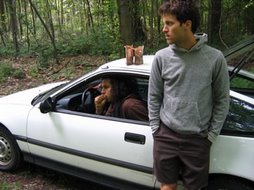
As anyone who reads this blog probably already knows, I am horrible at timely updates. Because I've been busy playing santa, getting shots I don't need, sleeping in bathhouses and airports, and being conned in foreign cities, I'm just now sitting down to write about the Taean oil spill.
This you probably already heard about: On December 7 an oil tanker was pierced by a crane-carrying barge off the western coast of the peninsula, causing 10.5 tons of crude oil to escape and blacken 300 kilometers of coastline in Chuncheongnam-do province. The area is renowned for its beauty and diverse ecosystems which support many important bird and fish species. The area also supports a large fishing and tourism industry.
Finally I have a way to describe my location to people living outside the country. When I was traveling this past week I met an Italian man and was trying to describe where I lived in Korea. "Near the oil spill," I said. A conversation that usually lasts 6 sentences was reduced to one and I suddenly realized what useful landmarks disasters can be. South Korea could rename its map with environmental disasters from now on, and with a new proposal by the president to dig a canal connecting Busan and Seoul, there may be a lot to rename in the east of the peninsula over the coming years.
It took a little under a week for the oil spill to wash up on shore and show a visual impact on the coastline. So, I decided to buy some golloshes, hope on a bus on a Saturday morning, and head towards Malipo beach, hoping that I could find a crew to volunteer with.
Mallipo was one of the first areas to be hit and the scene when I got off the bus reminded me of when scientists quarantine Alex's house in ET: white oil-resistant suits everywhere; the streets blocked off with trailers and supply tents; people with clip boards holding down their papers as helicopters descend into make-shift landing pads. Within a minute of stepping off of the bus I was greeted by a volunteer coordinator and ushered off to an area where I could be of some help.
A famous beach and one of the first to be hit by the spill, Mallipo was pretty well cleaned by the time I arrived. Most crude oil had been wiped from the sand and water flowing up through the tides. Gas rainbows still shown almost everywhere though. And worse off were the rocks on the periphery of the main surf, where a black watermark showed where the oil had ascended up the rocks with the tide waters. For 3 hours I blotted gas rainbows until the tides washed up too high to continue working.
I decided to stay another night and was taken in by a group of red cross volunteers who were staying nearby. I shared a room with a kid who is a year older than me and studies Hindi in Seoul. The next morning I went with Red Cross volunteer support crews to help at the nearby beach of Sindori. Far worse off than Malipo, the top of the beach still had solid chunks of crude waste that grew thicker the closer to the water's edge you walked. I spent six hours digging up crude with a hand shovel and despite the small amounts you accomplish by yourself, within those six hours we all cleaned a sizable chunk of that beach.
Its amazing how many Koreans were mobilized by the event and saw it as a national concern. Estimates show that over a half a million people have already showed up to volunteer and the work isn't finished yet. Also included in those numbers was a sizable number of expats who showed up to help.

No comments:
Post a Comment